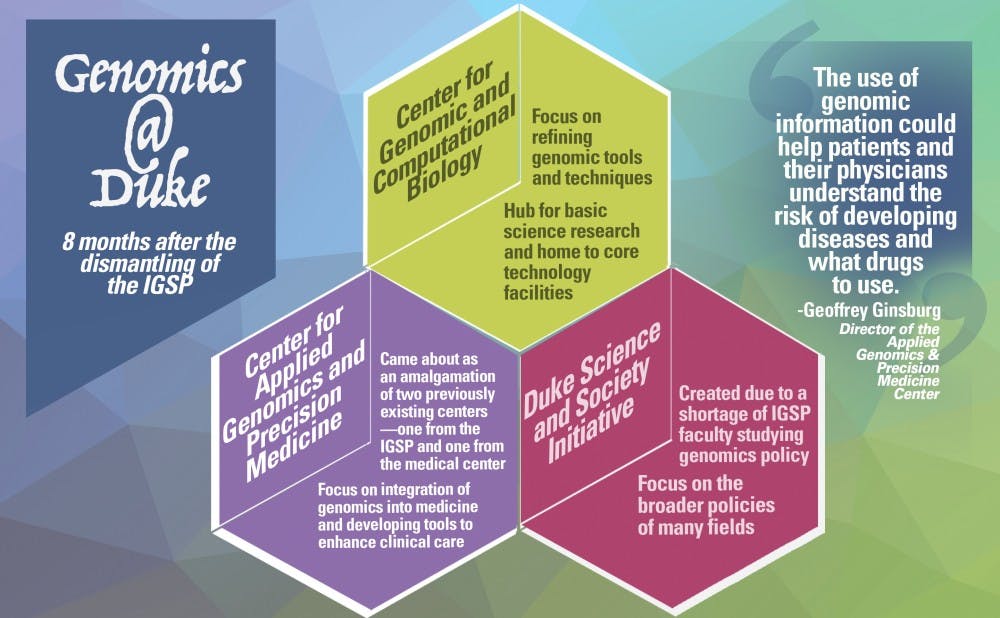Eight months after the Duke Institute for Genomic Sciences and Policy was dismantled, the study of genomics is at an all-time high for the University.
After its dismantling in July 2014, IGSP separated into three units—the Center for Genomic and Computational Biology, the Center for Applied Genomics and Precision Medicine and the Duke Science and Society initiative. Although all three are deeply rooted in IGSP’s 12 years of work, each new division tackles a specific area of rapidly evolving genomics study.
Transitioning between IGSP’s dissolution and the launch of new centers has had its challenges, but the collaborative research and educational environment of the three units has fared well, multiple administrators said.
“I think there’s a lot more flow across the three units,” said Geoffrey Ginsburg, professor of medicine and pathology and director of the new Applied Genomics and Precision Medicine Center. “I’ve also seen a lot more collaborative activities between the University and the medical center side than I saw under the IGSP umbrella.”
The IGSP underwent an external review in 2013 as part of Duke’s strategic plan to regularly review all of its signature institutes. Although the feedback was positive, university administrators, including former provost Peter Lange, current provost Sally Kornbluth and vice provost for interdisciplinary studies Susan Roth, ultimately decided that the institute had run its course.
“When we first set up these [signature] institutes, it was never intended they would be permanent,” said Roth about the review process. “In the case of IGSP, its purpose was to stimulate educational and research opportunities for students, and to form a community of students and faculty in the field. They had been so successful in doing that, it didn’t seem like the purpose was clear anymore.”
Gregory Wray, director of the Duke Center for Genomic and Computational Biology, compared IGSP’s dismantlement to the process of natural evolution, with steps leading up to the final decision last year. A shortage of IGSP faculty studying genomics policy led to the creation of the Science and Society Initiative, focused on the broader policies of many fields, he explained.
The Duke Center for Applied Genomics and Precision Medicine came about as an amalgamation of two previously existing centers—one from the IGSP and one from the medical center. Merging the programs under one roof made strategic and logistical sense, Ginsburg said.
“Its focus is on the integration of genomics into medicine and developing tools to enhance clinical care,” he said. “We can build models and predict whether patients will respond to certain treatments. Precision medicine is bringing those tools to patients, implementing them into clinical environments and teaching clinicians how to use them.”
Ginsburg added that the use of genomic information could help patients and their physicians understand the risk of developing diseases and what drugs to use.
With the change in the structure of the programs came a change in the mindset of the staff. The faculty there have reinvented themselves, Wray said, adding that they are no longer consumers, but developers of genomic technologies.
“As these technologies become more prevalent, we see ourselves as enablers for other people to use them on campus," he said.
These three units are designed to sustain the necessary work of the IGSP without requiring its infrastructure, Roth said. Undergraduate involvement in the IGSP, through outlets such as the undergraduate certificate in genome science and policy, have also been maintained through this transition period.
“They could decide that the certificate requires some changes to reflect the field,” Roth explained. “But we have no intention of shortcutting the students in terms of educational opportunities.”
Another concern during this transition has been in regards to accommodating the faculty, especially those who made a career decision to work specifically at the IGSP.
“I think pretty quickly they figured out this is just a name change,” Wray said. “I’ve met with them to understand their concerns—the morale is strong and people seem happy. We have a new sense of identity.”
Although the IGSP has been physically split, the units have maintained a collaborative atmosphere in their research and overlapping missions of education and training.
“I’ve seen an uptick in collaborations between faculty and other groups on campus, like working with investigators in social sciences and in other areas of the medical center that we hadn’t worked with before,” Ginsburg said.
Although every one of Duke’s institutes will undergo a review like IGSP, Roth said that no decision about dismantling any other institute has been made at this point. She also stressed that the very nature of the genomics field is largely why the IGSP was taken down.
“This is a rapidly changing field, so the questions that come up now are much more complex than they were 10 years ago when this started, and we want to be responsive to these changes,” she said.
Get The Chronicle straight to your inbox
Signup for our weekly newsletter. Cancel at any time.

